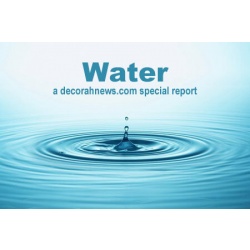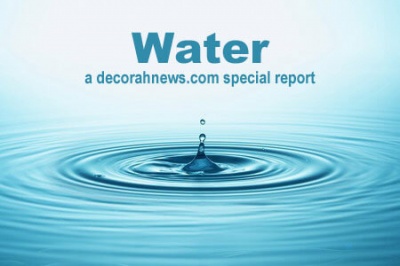
first on decorahnews.com: Latest Decorah Water Quality Report shows nitrate levels dropping
(decorahnews.com today begins a series of continuing articles about water quality issues in Decorah and Iowa)
The biggest concern about water quality in Decorah in recent years has surrounded nitrate levels in the drinking water.
The latest Water Quality Report for the city shows that efforts to decrease nitrate levels seem to be paying off.
Nitrates can come from a variety of sources, including septic tank leakage and erosion of natural deposits, but the most common source is runoff from fertilizer use--especially from farms upriver from Decorah.
Organizations like the Upper Iowa River watershed, which covers Winneshiek, Allamakee and Howard Counties in Iowa and Mower, Fillmore and Houston Counties in Minnesota, have been receiving funds for conservation projects aimed at slowing water runoff from fields in the area.
Once a year the Decorah Water Department issues a Water Quality Report--and this year's just-released report shows a decrease in the average nitrate levels from 6.25 parts per million to 5.48 parts per million.
Nitrate levels are sampled at six locations throughout the city--pump houses owned by the city on Water Street, Goose Island Drive and Mill Street. In 2015, two readings on Water Street nearly reached the "Maximum Contaminent Level"--the highest level of a contaminant allowed in drinking water before precautions are required. For nitrates, the MCL is 10 parts per million. Water Street Pump House #2 reached 9.6 parts per million, while Water Street Pump House #3 reached 7.9 parts per million.
For the 2016 tests, Water Street Pump House #2 fell to 6.2 parts per million, while Water Street Pump House #3 fell to 6.5 parts per million.
A number of other contaminants--including lead, chlorine, fluoride, barium and selenium--are measured in the same tests, but there has never been concern about those contaminants.
As our series of news stories continues, we will discuss local efforts to improve water quality, as well as the heated debate in Des Moines about Iowa's water quality.
Site designed and maintained by Iroc Web Design Services©.
Your Small Business Web Design Solutions.™


